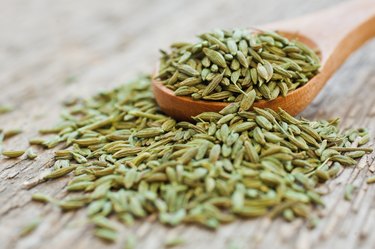
Whole fennel seeds, and herbal teas made from them, have a long history of medicinal and culinary use. They're used to ease digestive issues and enhance nursing, as well as to impart a licorice flavor to savory dishes. But even if you're seeking fennel seeds benefits, should you plan to limit them?
Tip
Serious fennel seeds side effects aren’t common. But some people may experience allergies or other side effects.
Video of the Day
Understanding Fennel Seeds' Side Effects
As with other ingredients, especially those that have both medicinal and culinary uses, research has been done on both fennel seeds' benefits and many of fennel seeds' disadvantages. In terms of potential fennel seeds' side effects, they include:
Video of the Day
- Carcinogen concern: A November 2018 review of research published in the Annals of Complementary and Alternative Medicine (ACAM) examined a compound found in fennel seeds, known as estragole, as a possible carcinogen. The European Medicine Agency has guidelines on safe amounts of estragole in fennel seeds, given that the natural compound can fluctuate within the fennel plant and its seeds. Most people do not exceed the safe amount of estragole through fennel consumption, according to ACAM. In addition, studies on mice in which liver tumors were caused by pure estragole may not be relevant, because humans appear to metabolize the compound more rapidly. If you use fennel seeds in abundance, asking your doctor about the issue may be relevant, depending on your medical history.
- Nipple discharge: Women, men and even children can get a condition known as galactorrhea, which causes a milky substance to leak from their nipples. Stimulating milk production is seen as one of many fennel benefits for nursing mothers, which is why it's included in some lactation tea blends. But a similar hormonal reaction from ingesting large amounts of the seeds can potentially become an unwelcome fennel seed disadvantage.
- Sun sensitivity: If you take fennel seed regularly, you may be more prone to burning if you don't wear sunscreen in bright conditions, or if you visit a tanning bed.
- Drug interactions: Because herbs and spices aren't regulated by the Food and Drug Administration, there aren't many official government agency warnings about drug interactions with fennel seeds. The pharmaceutical database Drugs.com suggests that women taking birth control pills use caution, because the seeds may make the pills less effective. Other potential drug interactions include Tamoxifen, a breast cancer treatment drug, and Ciprofloxacin, an antibiotic.
Read more: Herbal Teas That Are Alkaline
Warning
As with any herbs or seeds that you use in large quantities, it’s important to use a trusted supplier and to pay attention to any recalls. In 2019, the Food and Drug Administration put out a warning that an online supplier of herbs was recalling recent fennel seed purchases. A large lot of seeds may have been infected with salmonella, the supplier found.
Are You Feeling Tingly?
Some people have allergies to fennel seed, without realizing their symptoms are allergic ones — or that fennel may be the cause. For herbs and spices, the most common allergic responses are in your mouth and nose. If your nose or sinus cavities often feel itchy, keep a food diary to determine if fennel seeds or other ingredients you frequently consume may be to blame. The same precautions hold true if you feel tingling or numbness on your tongue and in your mouth, or if your lips swell.
According to the Mayo Clinic, fennel appears in two categories of allergens, both of which are pollen-related. The first is the birch family, which includes the other herbs and spices fennel is commonly grouped with — anise, parsley, coriander and caraway — as well as some fruits, nuts and root vegetables. The second group is the mugwort family, comprising fennel and similar herbs and spices, along with cruciferous vegetables, garlic, onions and some fruits.
Read more: Skin Rash From Fruits and Vegetables
Along with swelling and tingling around your mouth and face, additional food allergy symptoms can include hives on other parts of your body, upset stomach and wheezing. You may also become more sensitive to sunlight. Severe symptoms range from fainting to a dramatic drop in blood pressure. For severe reactions, it's important to seek immediate medical help.
If your symptoms are mild and you suspect fennel seed as the cause, cooking may mitigate pollen-food allergy symptoms, notes the Mayo Clinic. Rather than tossing raw fennel seeds into salad dressing or cheese spreads, experiment with adding them to cooked dishes like stew, curry and savory muffins. Alternatively, toasting the seeds in the oven, or on a cast-iron skillet, before adding them to your uncooked dishes, may also mitigate mild allergic responses.
- UCLA Louise M. Darling Biomedical Library: "Fennel"
- Annals of Complementary and Alternative Medicine: "Fennel - A Common Spice with Unique Medicinal Properties"
- PubMed: "Can Estragole in Fennel Seed Decoctions Really Be Considered a Danger for Human Health?"
- Mayo Clinic: "Galactorrhea"
- Drugs.com: "Fennel"
- FDA: "Fennel Seed Recall"
- University of Nebraska Food Allergy Research: "Spices and Herbs"
- Mayo Clinic: "Food Allergy"
- PubMed: "Drugs and Lactation Database - Fennel"